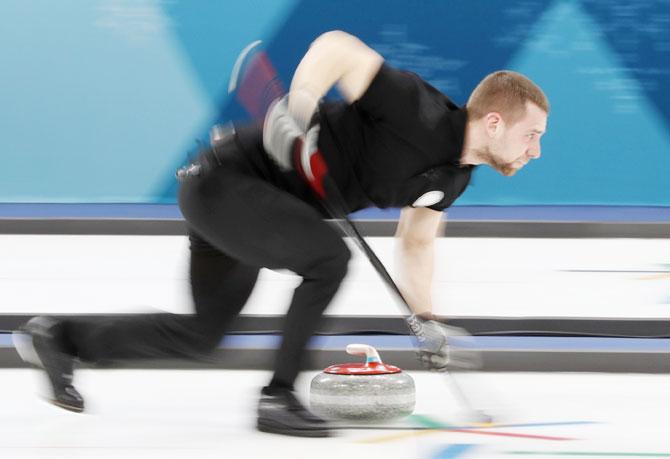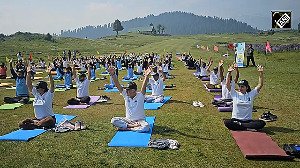
The Court of Arbitration for Sport has launched a doping procedure against Russian Olympic medallist Alexander Krushelnitsky, the court said in a statement on Monday.
The court said no hearing date had been fixed yet and no further information would be provided for the moment.
Krushelnitsky, who competes in curling, is suspected of testing positive for meldonium, a banned substance that improves exercise capacity. Krushelnitsky, who won bronze with his wife in mixed-doubles curling in Pyeongchang, has not responded to a request for comment.
Russia's curling federation has also launched an "emergency commission" to investigate the doping case, federation president Dmitry Svishchev told Reuters.
Krushelnitsky has left the Pyeongchang Winter Games on suspicion of doping, a team official said on Monday, in a scandal that has shocked his teammates and could imperil Russia's efforts to regain full Olympic status.
Krushelnitsky, who competes in curling, one of the Games' least physically taxing sports, is suspected of testing positive for meldonium, a banned substance that increases blood flow and improves exercise capacity.
Asked for an update on the case, Russian delegation spokesman Konstantin Vybornov told Reuters the athlete had surrendered his Games accreditation and left the Olympic village while awaiting the result of a second sample later on Monday.
He later denied having referred to any individual by name. But Russian women's curling coach Sergei Belanov replied to reporters' questions about Krushelnitsky, dismissing the idea that a "young, clever man" would use drugs in a sport where they would produce "no benefits".
"It's stupid, but Alexander is not stupid, so I don’t believe it," Belanov said.
Krushelnitsky won bronze with his wife Anastasia Bryzgalova in mixed-doubles curling in Pyeongchang. He has not responded to a request for comment.
Suspicions of a doping violation have rocked the Russian team, which have been trying to draw a line under years of drug-cheating scandals, and shocked the sport of curling, where steady hands and sharp eyes outweigh physical fitness.
"We were all shocked when we found out yesterday. Of course we very much hope it was some kind of mistake," Russian curler Viktoria Moiseeva told reporters, adding that the team believed Krushelnitsky was innocent.
"With us it's not faster, higher, stronger; it's about being more accurate. I can't imagine what kind of drugs you could use in curling ... so it's very hard to believe."
Russia has been accused of running a state-backed, systematic doping programme for years, an allegation Moscow denies. As a result, its athletes are competing at Pyeongchang as neutral "Olympic Athletes from Russia" (OAR), and banned from using their national flag or anthem.
Moiseeva said it would be dreadful if the scandal hurt Russia's chances of regaining its full Olympic status for future Games.
"It's a catastrophe, if it's not just one Olympics but others too -- it will throw sport in our country into turmoil. It's awful just to think about, to be honest."
The Russians had been hoping that a clean record at Pyeongchang would persuade the International Olympic Committee (IOC) to allow them to march at the closing ceremony on Feb. 25 with the Russian flag and in national uniform.
The IOC said on Monday that any doping violation would be decided by the Court of Arbitration for Sport and that a decision would come very quickly after analysis of a B sample.
If confirmed, the violation would be considered by the IOC's OAR Implementation panel, the body in charge of monitoring the OAR team's behaviour at the Games.
"I hope it's not true ... for the sport of curling," said Norwegian team skipper Thomas Ulsrud, whose team would stand to pick up the bronze if the doping result is confirmed.
"If it's true I feel really sad for the Norwegian team who worked really hard and ended up in fourth place and just left for Norway and they aren't even here."
Russian curling federation president Dmitry Svishchev said Russian curlers had been tested on January 22 before flying out to South Korea and the tests were negative.
"I have known these guys for many years. Only a crazy person takes banned substances before a competition, before the Olympics," Svishchev said on Sunday night when the news first broke. "It's a strange story. It raises a lot of questions."
The World Anti-Doping Agency banned meldonium with effect from January 2016, deeming it performance-enhancing because it enabled users to carry more oxygen to muscle tissue, something of benefit to endurance athletes in particular.
Former world tennis number one Maria Sharapova of Russia was barred from competition for 15 months after testing positive. In total, more than 170 athletes, including over 40 Russians, have tested positive for the drug since it was banned.













